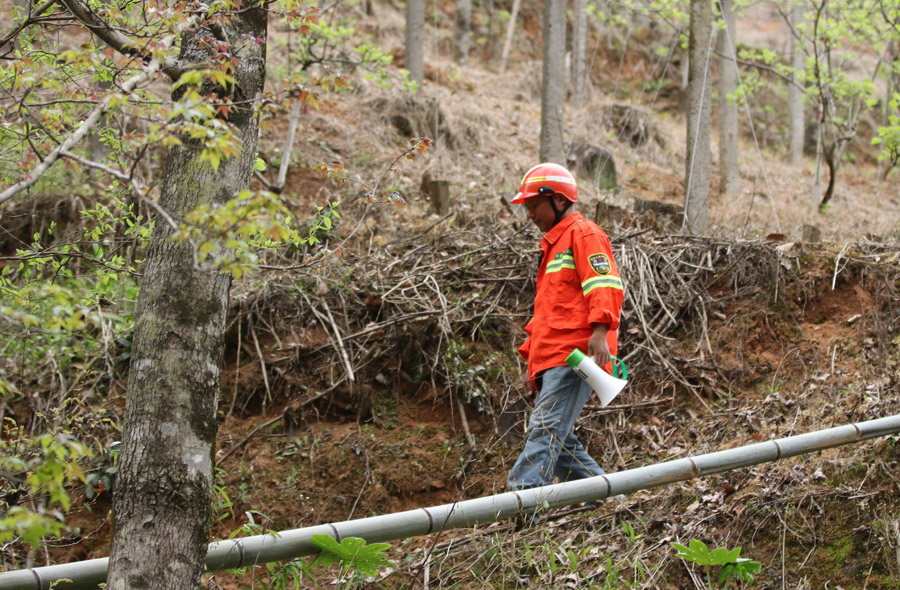In Anhui, thousands of 'forest chiefs' guard woodlands
 0 Comment(s)
0 Comment(s) Print
Print E-mail China Daily, April 24, 2018
E-mail China Daily, April 24, 2018
Jiang Yulong has been working on the State-owned Miaoshou forest farm in Jingde county, Anhui province, since 1986. Covering more than 3,500 hectares of mountainous area, the farm was established in 1959 mainly to supply timber.

"Hundreds of farmworkers had been relying on sales of timber, rather than the government," Jiang said.
That added pressure to produce. The farm cut down the old trees and replaced them with new varieties that grow more quickly. It was able to produce more than 70 million cubic meters of raw wood per year, which brought the farm about 5 million yuan ($797,000) in income to feed the workers, Jiang said.
The local government enacted a reform to transform Miaoshou into a nonprofit unit of the forestry administration in 2016 and finished it in July last year, about four months after Li Jinbin, Anhui's Party secretary, ordered the province to establish a "forestry chief" mechanism, which had not been tried before anywhere in the country.
Li proposed the initiative in March last year while participating in a tree-planting activity in Hefei, the provincial capital.
According to Qi Xin, deputy director of the forestry department in Anhui, "Officials recognize the importance of environmental protection, although most of them were not directly responsible for the task. One of the setbacks is that we found it very difficult to protect the forestry resources through the forestry administration authorities alone."
Now, more than 25,000 officials in the province have been appointed as "forest chiefs".
"As forest chiefs, their primary responsibility is to protect the forests and wooded areas, and also make use of them for developing the economy in more environmentally friendly ways," Qi said.
The forest chiefs have also helped Jiang's farm attract some investors to plant herbs under the trees to help local villagers increase their income.
"Officials - the forest chiefs at different levels - have been visiting the farm more frequently to keep updated with the latest status of the area," Jiang said.
Though cities and counties in the mountainous southern part of Anhui, including Jingde, generally have forest coverage of more than 60 percent, the province's average forest coverage is only about 28.7 percent. That's because the northern part of the province is flat and has been a major production base for grain, Qi said.
"We plant many trees every year. Many trees have not been protected well enough, and the quality of the existing forests and wooded areas needs to be improved," said Qi, adding that the new mechanism will help reach the goals.
Jingde was one of the first counties that responded to the forest chief initiative. Eight of the county's top officials have been appointed as chiefs to oversee the local forest chiefs, comprising more than 250 lower-ranked officials.
Qi said the forest chief mechanism stresses the quality of forests, not just their size. Those who perform well in the part-time position will get higher marks in evaluations for promotions.
By contrast, if large-scale accidents, such as forest fires or illegal logging, occur in the forests under their charge, the officials will face harsh punishments, possibly even removal from their full-time positions.
Last year, the Jingde government invested more than 15 million yuan to create a national forest park centered on the Miaoshou farm. The project was completed in December. The money was used mainly to build facilities such as walking paths and public toilets and to grow more trees suitable to local environmental conditions.
As Party chief of Luxi village in Jingde's Sanxi township, Huang Xiaoben was appointed as a forest chief last year to oversee more than 200 hectares of wooded area.
To protect the areas, Huang patrols virtually every day.
"I must prevent fires and stop the villagers from cutting down trees," Huang said.
Huang's area includes a large tea garden, which is surrounded by mountains and trees.
"Protection of trees leads to improvement of the local environment and tea quality, and then more tourists come to the village and tea fields," said Huang, adding that Luxi garnered revenues of more than 1.2 million yuan in 2017.






Go to Forum >>0 Comment(s)